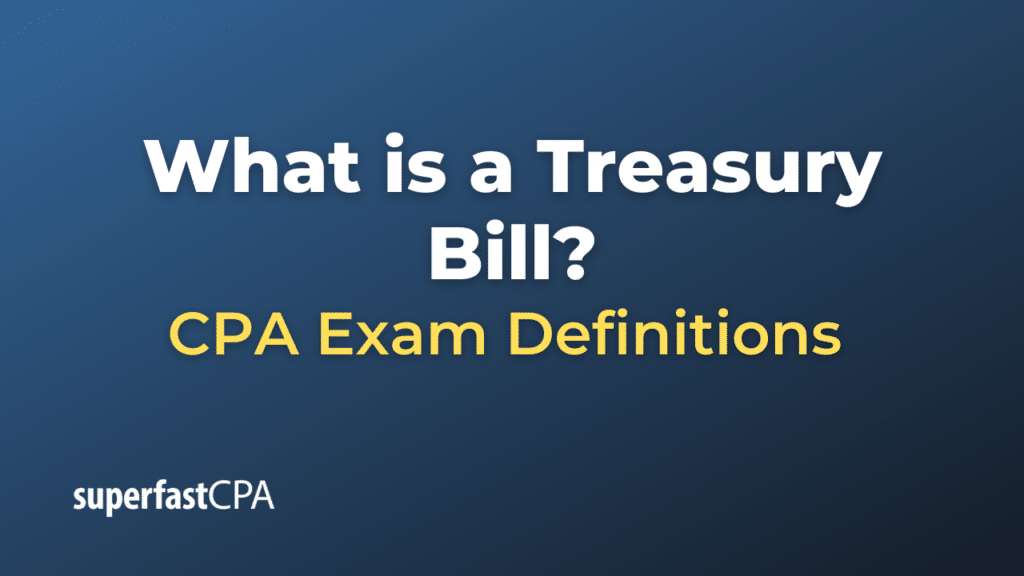Treasury Bill
A Treasury Bill (often abbreviated as T-Bill) is a short-term debt security issued by a government, particularly the U.S. government. T-Bills are considered among the safest investments available because they are backed by the full faith and credit of the issuing government.
Here are some key points about Treasury Bills:
- Maturity: T-Bills have short maturities, typically issued with durations of a few days up to one year. Common maturities are 4 weeks, 13 weeks, 26 weeks, and 52 weeks.
- Discounted Securities : Unlike traditional bonds, T-Bills do not pay periodic interest (or coupon payments). Instead, they are sold at a discount to their face value. When the T-Bill matures, the government pays the holder the full face value. The difference between the purchase price (discounted price) and the face value is the investor’s interest earnings.For example, if an investor buys a $1,000 T-Bill for $980 and holds it until maturity, the government will pay the investor the full face value of $1,000. The $20 difference is the interest earned by the investor.
- Safety: T-Bills are considered one of the safest investments, given that they are backed by the U.S. government. This safety often means they offer lower yields compared to more risky assets.
- Liquidity: T-Bills are highly liquid, meaning they can easily be sold and converted to cash.
- Tax Considerations: In the U.S., the interest earned from T-Bills is exempt from state and local taxes, though it is subject to federal income tax.
- Purchase and Trading: Investors can buy T-Bills through the U.S. Department of the Treasury’s auction system (called TreasuryDirect) or on the secondary market through a bank or broker. The minimum purchase amount is $100.
- Yield: Because of their short-term nature and safety, T-Bills typically have lower yields than longer-term government securities, such as Treasury notes or bonds.
T-Bills serve multiple purposes: they provide a way for the government to raise short-term funds to finance their operations, and they offer a means for investors to park their money in a low-risk asset, especially during volatile market conditions.
Example of a Treasury Bill
Let’s use a hypothetical example to illustrate how a Treasury Bill (T-Bill) works:
Scenario: Investing in a 26-week T-Bill
Suppose you have $10,000 that you’d like to invest safely for a short period, say 6 months. After researching, you decide to invest in a 26-week T-Bill.
T-Bill Auction: The U.S. Department of the Treasury announces an auction for 26-week T-Bills. You decide to participate.
- Bid and Purchase:
- The T-Bill has a face value of $10,000.
- You submit a competitive bid and get the T-Bill at a discount price of $9,800.
- No Periodic Interest:
- Remember, T-Bills don’t pay periodic interest. Instead, they are sold at a discount and redeemed at face value upon maturity.
- Maturity:
- After 26 weeks (6 months), the T-Bill matures.
- The U.S. government pays you the full face value of the T-Bill, which is $10,000.
- Interest Earnings:
- The difference between the face value ($10,000) and your purchase price ($9,800) is your interest earnings.
- Therefore, you earned $200 ($10,000 – $9,800) from your T-Bill investment over the 6-month period.
- Annualized Yield:
- Even though you earned $200 over 6 months, to get an annualized yield (for comparison purposes to other annual returns), you’d double the 6-month return. So, your annualized earnings would be $400 for the year on a $9,800 investment.
- The annualized yield would be: ($400/$9,800) x 100% = 4.08%.
In this example, the T-Bill provided a safe and predictable return on the invested capital. While the rate might seem lower compared to riskier investments, T-Bills offer unparalleled security, especially in uncertain economic times.













